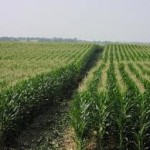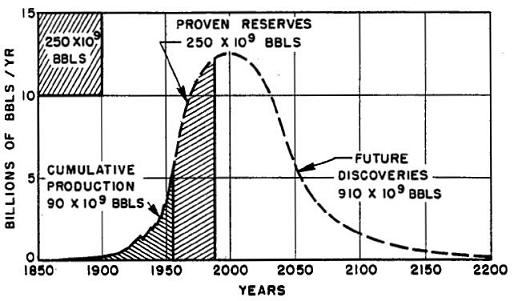This post was published by OpEd News,
Peak Oil , re-posted Hubberts Peak, The Economy, and War for Oil
I came across an historic and seminal document on a website called Energy & Capital https://www.energyandcapital.com/articles/past-peak-oil/3109, that had a link to Marion King Hubbert’s 1956 speech about Peak Oil. Hubbert asserted that global oil production would follow a bell-shaped curve with a peak followed by an irrevocable decline.
Marion King Hubbert was an unlikely prophet. When he wrote this memo and presented it  he was working for Shell oil as a geologist. In the paper that he presented to the American Petroleum Institute “Hubbert correctly predicted that production of oil would peak in the continental US around 1965-1970. Hubbert further predicted a worldwide peak at about 50 years from publication of his memo. https://en.wikipedia.org/wiki/Hubbert_peak_theory. Peak Oil is neither a theory, nor does it mean the world is running out of oil. The question however is whether or not we’ll be able to economically produce that oil,and what the more expensive less easily recovered oil will do to our economy already teetering on the edge of an energy, environmental, economic, and equity crisis?
he was working for Shell oil as a geologist. In the paper that he presented to the American Petroleum Institute “Hubbert correctly predicted that production of oil would peak in the continental US around 1965-1970. Hubbert further predicted a worldwide peak at about 50 years from publication of his memo. https://en.wikipedia.org/wiki/Hubbert_peak_theory. Peak Oil is neither a theory, nor does it mean the world is running out of oil. The question however is whether or not we’ll be able to economically produce that oil,and what the more expensive less easily recovered oil will do to our economy already teetering on the edge of an energy, environmental, economic, and equity crisis?
That America’s oil would peak by 1970 was dismissed by everyone in the petroleum industry. But when U.S. oil production did peak in November of 1970 Hubbert’s work began to be taken seriously by scientists in the petroleum industry, government, and academia. This information did not make a media splash and the public was largely kept in the dark because the oil companies and the US government were reluctant to alarm the beneficiaries of the cheap oil that powered America and the developed world’s consumer based, fossil fuel addicted economy.
Hubbert predicted that world oil supply would peak around 2000 (many observers now  agree that it actually peaked in 2004). But even today, few people in government or the corporate media have been warning the public about the implications for the economy.
agree that it actually peaked in 2004). But even today, few people in government or the corporate media have been warning the public about the implications for the economy.
This dearth of coverage is partly because the oil producing countries and the oil companies do not want to publish or confirm data on the amount of oil reserves because if the world has hit “Peak Oil” and is sliding down slope to scarcity, such a message could spark a panic in the markets or a rush to investment in alternative energy and fuels that would be damaging to the bottom line of fossil fuel industries. It would also shine a bright light on America’s misguided strategy for keeping the oil flowing, and prices low.
The US government has done everything it can to keep the price of oil artificially low through subsidies, tax breaks, and incentives. Some of the recipients of this government largesse have spent $ millions in lobbying to support their congressional cronies. The biggest contributors, Shell, Exxon, and Conoco Phillips, have spent over $105 million on lobbying Congress since 2011. Oil PACs have donated over $2.16 million to mostly Republican candidates. Koch Industries spent $16.2 million on lobbying and more than $1.3 million from its PAC.
To keep prices stable, oil producing countries look like they are competing to see which can “produce” the most oil. In reality they are vying to see which will reach the bottom of the barrel first. In this race to the bottom, these producers including the US are creating, environmental havoc.
The problem is exacerbated by the hype that arctic oil reserves, or Canadian tar sands, more off shore deep water drilling, or “fracking” will preserve the status quo or even reverse the slide to scarcity. The problem with these solutions is the “energy return on investment” (EROL). EROL is important because dwindling fossil fuels are beginning to use more energy to extract then they produce.
Although renewable technologies already have a better EROL than fossil fuels, very few countries (except perhaps Germany) are committed to the kind of program that would soften the “crash” that is likely to happen when energy produced by fossil fuels and nuclear become extremely expensive and scarce. EROI is important because it’s falling fast in the fossil fuel space, as dwindling supplies take more energy to extract. The  problem is, we built industrial society on fossil fuels, while a sustainable society must be built on renewable energy.
problem is, we built industrial society on fossil fuels, while a sustainable society must be built on renewable energy.
Chris Martenson, on his blog, and in his book The Crash Course has a very scary chart illustrating how many thousands of nuclear power plants, hundreds of thousands of acres of solar arrays, hundreds of thousands of wind turbines, or millions of acres of soy beans or corn that will be needed to replace the liquid fuel equivalent needed to maintain a consumptive western society at 2009 levels. In the case of bio fuels, the world would need to plant more acreage in soy and corn that is in total agricultural use in world today. The notion that “they will come up with something to replace oil” is thoughtless and irresponsible. Even in countries with a robust alternatives program there does not appear to be enough time, money, or “bridge fuels” to make the transition painlessly.
today. The notion that “they will come up with something to replace oil” is thoughtless and irresponsible. Even in countries with a robust alternatives program there does not appear to be enough time, money, or “bridge fuels” to make the transition painlessly.
Richard Heinberg, author of “Peak Everything, has written:“In facing future scenarios that involve a transforming climate with an increase in possibility of extreme weather and storms; a disrupted economy and threatening collapse; an energy economy based on declining supplies of oil and other non-renewable fuels an observable diminishment of water and food resources; a threat of pandemic disease occurring in an ever destabilizing social environment where the medical emergency establishment is understaffed–undercapitalized, unprepared; and the possibilities of mass migrations in the first world – there are four possible strategies that the United States and other nations might employ to respond to economic challenges associated with “Peak Oil:”
- Last One Standing: Global competition for remaining resources
- Power-down: Global cooperation in reducing energy usage, conservation, resource management, and reducing population
- Denial: Waiting, and hoping that some unforeseen element will solve the problem
- Building Lifeboats: Preparing local areas to be sustainable in the event that the global economic project collapses.
It appears that the US is pursuing the “Last One Standing” strategy to maintain the illusion of plentiful oil by weakening environmental laws, continuing to subsidize fossil fuel  exploration on public land and in the arctic, and ultimately to go to war for what some in government believe is a right to access strategic and diminishing oil reserves in other countries.
exploration on public land and in the arctic, and ultimately to go to war for what some in government believe is a right to access strategic and diminishing oil reserves in other countries.
Even before the September 11, 2001 terrorist attacks on the United States, the Bush administration was planning for the invasion of Iraq, and that plan included the acquisition of Iraq’s oil reserves.
In April 2001 a report, “Strategic Policy Challenges for the 21st Century,”that was prepared  at the request of Vice President Cheney by the James A. Baker Institute for Public Policy https://www.informationclearinghouse.info/article3535.htm, and the US Council on Foreign Relations. The report in part says:“Iraq remains a destabilizing influence to U.S. allies in the Middle East, as well as to regional and global order, andto the flow of oil to international markets from the Middle East. Saddam Hussein has also demonstrated a willingness to threaten to use the oil weapon and to use his own export program to manipulate oil markets…. The United States should conduct an immediate policy review toward Iraq, including military, energy, economic, and political/diplomatic assessments…… Sanctions that are not effective should be phased out and replaced with highly focused and enforced sanctions that target the regime’s ability to maintain and acquire weapons of mass destruction.”
at the request of Vice President Cheney by the James A. Baker Institute for Public Policy https://www.informationclearinghouse.info/article3535.htm, and the US Council on Foreign Relations. The report in part says:“Iraq remains a destabilizing influence to U.S. allies in the Middle East, as well as to regional and global order, andto the flow of oil to international markets from the Middle East. Saddam Hussein has also demonstrated a willingness to threaten to use the oil weapon and to use his own export program to manipulate oil markets…. The United States should conduct an immediate policy review toward Iraq, including military, energy, economic, and political/diplomatic assessments…… Sanctions that are not effective should be phased out and replaced with highly focused and enforced sanctions that target the regime’s ability to maintain and acquire weapons of mass destruction.”
This rationale and the ensuing war to maintain a supply of cheap oil directly and indirectly led to the death of thousands (perhaps hundreds of thousands) of US and Allied soldiers and Iraqi civilians. The Bush  administration claimed we were going to war to overthrow a dictator who had weapons of mass destruction and supported terrorists. Both claims were fictions.
administration claimed we were going to war to overthrow a dictator who had weapons of mass destruction and supported terrorists. Both claims were fictions.
According to Greg Muttitt in his book, Fuel on the Fire, Oil and Politics in Occupied Iraq, https://www.fuelonthefire.com/, Bush’s first Treasury Secretary Paul O’Neill, who was fired in late 2002 after disagreeing with Bush on Iraq, was one of the first insiders to detail the administration’s Iraqi oil obsession, tracking it back to just after Bush’s inauguration as his advisers were even then planning how to divide up Iraq’s oil wealth.
O’Neill also told author Ron Suskind https://www.cbsnews.com/8301-18560_162-592330.html that Bush’s first National Security Council meeting just days into his presidency included a discussion of invading Iraq and that the message from Bush was “find a way to do this.”
Subsequent disclosures have corroborated O’Neill’s account about the importance of oil in Bush’s calculation. “According to some documents from Vice President Cheney’s March 2001 Energy Task Force included a map of Iraqi oil fields, pipelines, refineries, terminals, and potential areas for exploration. There also was a Pentagon chart titled “Foreign Suitors for Iraqi Oilfield Contracts,” and one chart detailing Iraqi oil and gas projects.”Judicial Watch, a conservative legal group, obtained task force-related Commerce Department papers corroborated this assertion .https://www.judicialwatch.org/bulletins/maps-and-charts-of-iraqi-oil-fields/ .
During “Mission Accomplished” in 2003, then Deputy Defense Secretary Paul Wolfowitz unflappably responded to a question about why Bush attacked Iraq, but not North Korea, by saying “Look, the primarily difference — to put it a little too simply — between North Korea and Iraq is that we had virtually no economic options with Iraq because the country floats on a sea of oil.” https://www.defense.gov/transcripts/transcript.aspx?transcriptid=2704
John McCain said in May of 2008, “My friends, I will have an energy policy which will eliminate our dependence on oil from Middle East that will then prevent us from having ever to send our young men and women into conflict again in the Middle East.”
McCain’s utterances have been interpreted to mean that his Middle East policy, If he had become President would have nothing to do with freeing oppressed people, or defending ourselves against future attacks, or about weapons of mass destruction, or protecting Israel. It’s about gaining control of foreign oil.
Because it is only a matter of time before there is a serious oil depletion crisis. A crash of some magnitude appears inevitable.It is growing more and more likely that there will be wars for the last oil. “The American oil wars are being launched out of weakness, not strength. The American economy is teetering and without control of the remaining oil it will collapse. There will be massive chaos in any case, when only enough oil remains for the American elite and whomever they choose to share it with.“ Joe Lauria, The Coming War with Iran: It’s About the Oil, Stupid.
The bursting housing bubble, and Wall Street/big bank/big insurance meltdown are just a preview of what the economic implications of peak oil, liquid fuel scarcity, and the failure of a mythical “technological” solution, will have on the economy of the US and the developed world.
Whether or not we go to war for oil in the foreseeable future, there is little doubt that a Western consumer society on a global scale is unsupportable and new approaches to living within our means have to be considered.
”To adapt to a profoundly different post carbon world, we must begin now to make radical changes to our attitudes, behaviors and expectations. The economy of the future will necessarily be steady-state not requiring constant growth. It will be based on the use of renewable resources harvested at a rate slower than that of natural replenishment; and on the use of non-renewable resources at declining rates, with metals and minerals recycled and re-used wherever possible. Human population will have to achieve a level that can be support by resources used this way, and that level is likely to be significantly lower than the current one.”The End of Growth, Richard Heinberg, https://richardheinberg.com/bookshelf/the-end-of-growth-book
Here we are almost 60 years after Hubbert’s memo, and people are still arguing about Peak Oil. The really disturbing part in all of this is howthe public remains content living in denial of the implications of Peak Oil on the economy, national security, and the environment.Peak Oil is still dismissed as “theory” and media headlines and fossil fuel company “data” are used to “prove” that we still have plenty of barrels of oil reserves left to tap on this planet.
“On that day in 1956 whenHubbert took to the podium in San Antonio, oil was cheap for us to pump and easy to get. Now it is neither.” Keith Kohl, Past Peak Oil.


“You never change things by fighting the existing reality.
To change something, build a new model that makes the existing model obsolete.”
― R. Buckminster Fuller
People will never wake up. An individual person will, but in general, people will not. Our future path will be discovered and nurtured by groups of individuals looking for a different way forward. One that is in line with their goals for this life. Our job is to build this new life over time, between individuals, in the hopes that when the time comes we’ll be good enough at it to share our knowledge more widely.
We must focus on being good, not just less bad. I have no desire to lessen my footprint! I want huge footprints. I want all in my system to nourish and thrive.
Even the lowly earthworm increases soil fertility everywhere she goes. I can’t get by for more than 90 seconds without tree exhalation (aka oxygen). Why does humanity exhale poisons?
“If you want to teach people a new way of thinking, don’t bother trying to teach them. Instead, give them a tool, the use of which will lead to new ways of thinking.”
― Richard Buckminster Fuller
We need to reengage with the flow of life systems. Once again become a part of nature, not apart from. What tools are at our disposal?